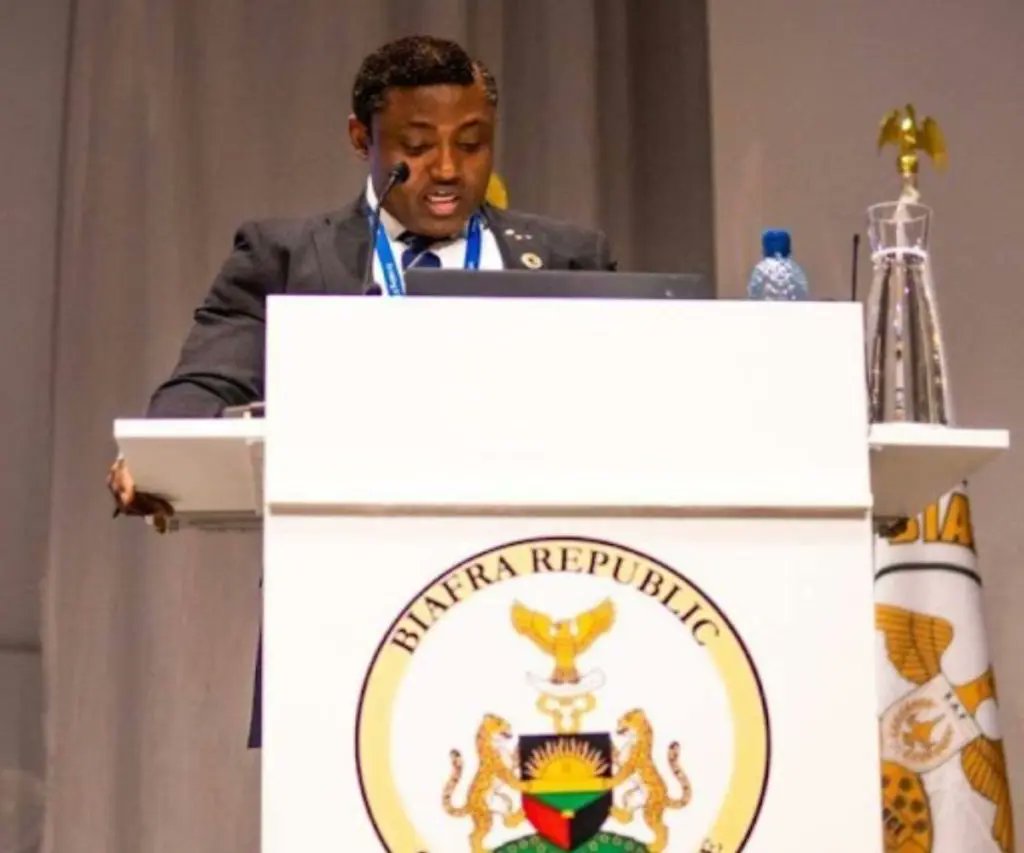All people have the right to self-determination. By virtue of that right they freely determine their political status and freely pursue their economic, social and cultural development, according to the United Nations.

Biafra Republic Government In-Exile’s Prime Minister Simon Ekpa has urged the Nigerian government to accept the result of the self-referendum for Biafra Liberation.
Mr Ekpa, said this in a statement on Thursday via his official X handle.
He had said that over 50 million people voted in support of Biafra self-rule in a poll conducted by BRGIE.
According to Finland-based Mr Ekpa, the massive voting by Biafrans for liberation is due to the long-standing marginalization by the Nigerian government.
He stressed that Nigeria should embrace the decision of Biafrans to self-rule.
“The Biafra government is calling on Nigeria to honorably accept the self-referendum result for Biafra.
“Nigeria must accept Biafra’s self-referendum to avoid inevitable historic shame.
“The Biafra referendum question was not confusing, and Biafrans are happy.
“The Biafra self-referendum question is: ‘Do you approve this proposed declaration of the restoration of the independent state of Biafra, to reestablish the lost sovereign nation of Biafra from Nigeria, which will be called the United States of Biafra (USB)?’
“And over 50 million answered YES as of today, 29.8.2024,” Mr Ekpa wrote on X.
Nigeria’s Defence Headquarters (DHQ) had on Tuesday announced that the Nigerian government is currently engaging the European Union (EU) to extradite Ekpa.
Reacting to this, Mr Ekpa invited DHQ spokesperson Buba Edward and Nigerian Minister of Foreign Affairs Yusuf Tuggar to participate in the upcoming Biafra Convention scheduled for November 29 to December 3, 2024, in Lahti, Finland.
Mr Ekpa came to national prominence after he announced on his Facebook page in 2021 that the leader of the Indigenous People Of Biafra (IPOB), Nnamdi Kanu had ordered him to assume the role of broadcaster on the group’s radio station, Radio Biafra.
IPOB was formed in 2012 as a peaceful movement, but launched an armed wing in south-eastern Nigeria in 2020, saying it was doing so to defend the Igbo ethnic group.
Mr Kanu is facing trial on terrorism charges levelled against by then-President Muhammadu Buhari’s administration over his call and agitation for a sovereign state of Biafra. He was extraordinarily renditioned from Kenya in June 2021 by former President Buhari’s government and has remained in detention since then.
Mr Kanu’s initial arrest in 2015 triggered protests by his supporters. In 2017, Justice Binta Nyako of a Federal High Court in Abuja granted Kanu bail.
Upon his release, a military invasion of his ancestral home in Umuahia, Abia State, in September 2017, forced him into exile, hence he did not attend his trial on the next scheduled date and thereafter. From then till June 2021 when he was abducted from Kenya and was subjected to “extraordinary rendition”, and brought back to Nigeria, there has been a robust public debate as to whether he jumped bail or not.
But, the Appeal Court had discharged and acquitted Kanu of all terrorism charges. This judgment was later overturned by the Supreme Court which transferred the case back to the Federal High Court.
Mr Kanu, who holds a UK passport, has remained in prison, despite the Appeal Court ordering his release in October 2022 after ruling that he had been illegally arrested abroad.
Kanu’s attorney, Aloy Ejimakor, in January, clarified that the Supreme Court had settled the controversy on whether Kanu jumped bail or not.
The attorney said the Supreme Court also clarified that Kanu’s bail “should not have been revoked”.
In the Certified True Copy (CTC) of the judgment delivered in December 2023, the apex court declared that Kanu did not jump bail.
IPOB wants a group of states in the south-east of Nigeria, which mostly comprises the Igbo ethnic group, to break away from the country and form an independent nation called Biafra.
The secessionist campaign first gained impetus in the 1960s, when an Igbo army officer, Emeka Odumegwu Ojukwu, declared the birth of Biafra following killings of south-easterners in northern Nigeria.
But that attempt at secession ended after a bloody three-year war that led to more than a million deaths from fighting, starvation and a lack of medical care.
But the idea of Biafra has never gone away and despite arrests of his members, Mr Kanu’s movement has seen a recent swell in its numbers.
All people have the right to self-determination. By virtue of that right they freely determine their political status and freely pursue their economic, social and cultural development, according to the United Nations.
Essentially, the right to self-determination is the right of a people to determine its own destiny. In particular, the principle allows a people to choose its own political status and to determine its own form of economic, cultural and social development. Exercise of this right can result in a variety of different outcomes ranging from political independence through to full integration within a state.
